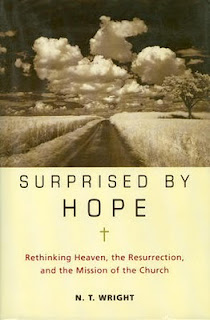 This is one of the best books I've ever read (to be suspected, of course, because N.T. Wright is a B.A.M.F.). It's all about Christian eschatology centered on the resurrection of Jesus. The first third of the book is all about the resurrection of Jesus seen in the light of pagan and Jewish worldviews and how Christianity reworked the Jewish doctrine of resurrection in light of the resurrection. Wright doesn't dive too deep into the historical arguments for the resurrection (there are some great books on that), but he does employ historical studies to show how current skepticism and interpretation of the resurrection has come about, and he also examines the resurrection from a pragmatic perspective: seeing what it means, and how it demands much of us, many people skitter around it. The second third of the book is all about Christian eschatology in light of Jesus' resurrection: the re:creation of the cosmos, bodily resurrection, judgment, and the appearing (or "return") of Christ. He also tackles such issues as the ascension of Jesus and what theologians call the "intermediate states" of paradise (heaven) and hell. He gives an overview of the three most popular perceptions of eternal hell (conscious torment, conditional immortality, and universalism), and he proposes his own view that is quite surprising (though I don't agree with it). The last third of the book is all about the mission of the church as an eschatological uprising, living the future in the present, and what that means not only for the mission of the church but also for the life of the individual Christian. Very captivating and interesting stuff, stuff that demands to rethink all the long-held assumptions about salvation and evangelism.
This is one of the best books I've ever read (to be suspected, of course, because N.T. Wright is a B.A.M.F.). It's all about Christian eschatology centered on the resurrection of Jesus. The first third of the book is all about the resurrection of Jesus seen in the light of pagan and Jewish worldviews and how Christianity reworked the Jewish doctrine of resurrection in light of the resurrection. Wright doesn't dive too deep into the historical arguments for the resurrection (there are some great books on that), but he does employ historical studies to show how current skepticism and interpretation of the resurrection has come about, and he also examines the resurrection from a pragmatic perspective: seeing what it means, and how it demands much of us, many people skitter around it. The second third of the book is all about Christian eschatology in light of Jesus' resurrection: the re:creation of the cosmos, bodily resurrection, judgment, and the appearing (or "return") of Christ. He also tackles such issues as the ascension of Jesus and what theologians call the "intermediate states" of paradise (heaven) and hell. He gives an overview of the three most popular perceptions of eternal hell (conscious torment, conditional immortality, and universalism), and he proposes his own view that is quite surprising (though I don't agree with it). The last third of the book is all about the mission of the church as an eschatological uprising, living the future in the present, and what that means not only for the mission of the church but also for the life of the individual Christian. Very captivating and interesting stuff, stuff that demands to rethink all the long-held assumptions about salvation and evangelism.I'm going through a bunch of N.T. Wright's books right now. Next on the list is "Simply Christian," which I read in 2007 but wasn't really able to grasp. I've flipped through some of the pages and with the backdrop of what Wright writes in "Surprised By Hope," much more of it makes sense. Then I'm going to read "The Challenge of Jesus," and then I'm off to "Paul in Fresh Perspective" (which, again, I read in 2007), and then I'm going to launch into his newest book (I think), "After You Believe: Why Christian Character Matters." In the fall I plan on reading through his three biggest books, each close to 1000 pages. Quite a task it will be. I'm reading his more "layman" books right now so when I get to those, I won't be too lost and confused.


No comments:
Post a Comment